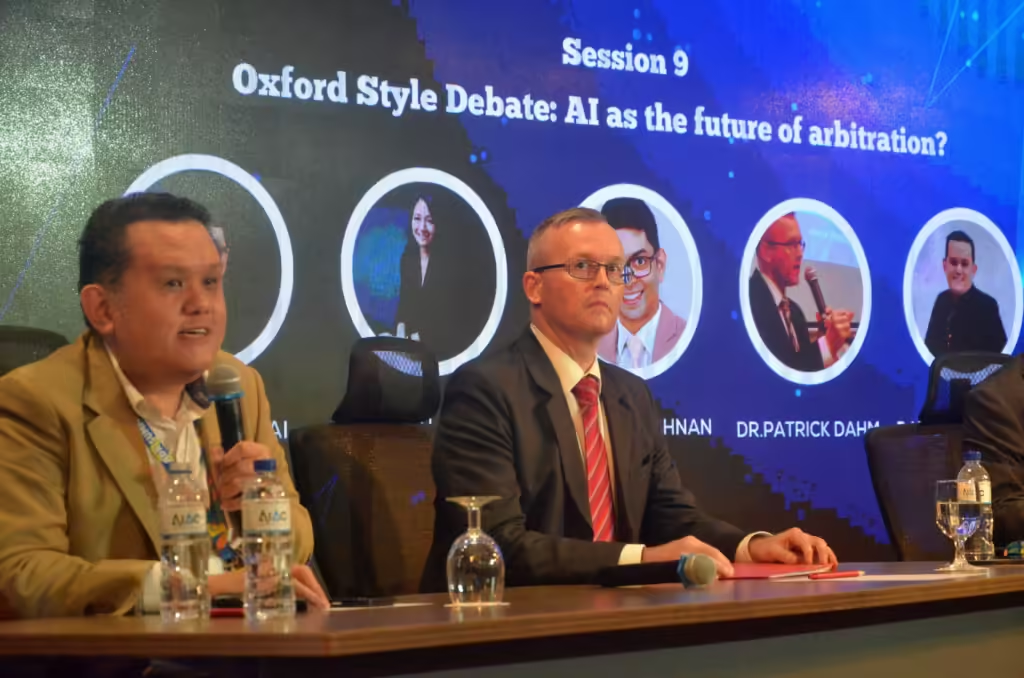Last weekend the Asia ADR Summit was held in Kuala Lumpur. I had the honour and pleasure of participating in an Oxford-style debate on the topic: ‘This House believes that “humanity” is dispensable in arbitration, and artificial intelligence will supplant arbitrators in the future’.
Here is my statement and my rebuttal.

There were two debating teams and a moderator, Chung Ting Fai. David Yek and I argued in favour of the motion. Our debate opponents were Crystal Wong and Anirudh Krishnan. Interestingly (perhaps), in a similar debate in the past, I argued that artificial intelligence would not replace arbitrators within twenty-five years. Now, in Kuala Lumpur, I would argue the opposite. Then as now, it was a lot of fun.

The Statement
My esteemed fellow speaker in support of the motion has given convincing reasons why humanity – the quality of being human, humane even – is dispensable in arbitration and why artificial intelligence will supplant arbitrators in the future. I could leave it at that, especially since my learned friend speaking against the motion has given good reasons for being human, which are beyond doubt, but has not, in my opinion, given a good reason why humanity is indispensable in arbitration.
But let me add something anyway.
You will have noticed that the arguments of my esteemed fellow speaker were of an intrinsic nature. Let me round them off with an extrinsic reason. This may turn out to be a bit of a telling-off for the human listeners in the audience, but I cannot help it.
Humanity is dispensable in arbitration, and artificial intelligence will supplant arbitrators in the future because we humans allow it to happen. It’s a bit like Grab and the traditional taxi industry.
Before continuing, I would like to state that I have no financial interest in Grab or any of its subsidiaries (collectively, ‘Grab’). In particular, I have not invested in Grab securities or benefited from warrants or other derivatives. I do not receive any remuneration from Grab, nor do I serve as a director or officer of any Grab company, and Grab or any other third party has not provided or agreed to provide me with any remuneration in connection with this debate.
All Well with Taxis at First
Today, Grab sometimes acts as if it is the first to come up with the idea of ride-hailing services. That’s not true, of course, because for as long as there has been road transport – longer than there have been motorised vehicles – there has been an industry transporting people in vehicles from A to B: the taxi industry.
For a long time, members of the taxi industry have been the undisputed top dogs in the field. This, it must be said, has made them complacent and comfortable in some parts of the world, to the detriment of users. It happened in our part of the world too. Does anyone remember? It was only twelve years ago.
I live in Singapore, so I’ll use Singapore as an example. When I first came to Singapore in 2001, the only person-hailing rides were the old-school taxis, and they were great. They were everywhere, you could hail one on any street corner and it would take you to your destination. A taxi was fast and cheap.
Market Consolidation
But as time went on, something changed. Taxis became rarer and rarer. Not rarer at first, but harder to come by. There were several reasons for this, to do with the market consolidation of taxi companies.
Driver Liability
For example, taxi companies imposed strict liability rules on their drivers. For reasons of overall efficiency, a taxi driver involved in an accident had to pay a high personal contribution to the settlement of claims, regardless of whether he was at fault or not. This created an incentive not to carry passengers at times when accidents were more likely. The result was that when there was a tropical downpour and you needed a taxi urgently, the few brave taxis out there would all be taken and none of the others would stop. You would be stuck where you were forever, or at least for a very long time, and it would be difficult to explain to your date that you had no intention of standing her up.
Cleaning Duty
The taxi companies also imposed strict cleaning requirements on their drivers. Drivers now had to clean their cabs themselves at the end of their shift before they could go home. This was another reason why many taxi drivers soon stopped picking up passengers in bad weather or at dawn after a night out in the clubs.
SMS-a-Cab
Or my personal favourite, the introduction of call-a-taxi services via SMS. This was so convenient because you could now order a taxi to come to you for an extra charge. But it also meant that you could no longer just hail a taxi at the end of a big event. I experienced this many times myself: after a concert at the Indoor Stadium in Singapore, the place was packed with people trying to leave. Taxi drivers knew this, so within three miles of the stadium there were more taxis than ordinary cars. In fact, they were so close you could see the whites of the drivers’ eyes. But no taxi would take you unless you ordered one via SMS for an extra three dollars, at a time when three dollars was often a quarter to a third of the fare.
All of this alienated the taxi passengers, and resentment grew over time. But the taxi industry did nothing because it felt safe. Until at some point it was too much.
Enter Grab.
Alternative Transport Solution
What was new about Grab was not the idea of taking people to places. Grab did just that. It did things differently to offer a new ride experience, it also experimented a lot with new technology and so on, but overall it was always about getting someone from A to B. What was new about Grab, and what mattered to its users, was that it could do it faster, cheaper and better than a taxi.
There are still taxis. There are far fewer of them, but they still exist. But now even taxis often drive under the Grab banner, and it doesn’t look like this trend is going to reverse.
The Taxi Industry Within
You know where I’m going with this. Today, the taxi industry is us, the arbitration industry, and Grab is AI. The unhappy passengers are the unhappy users of arbitration, that is, the parties.
We have always told the parties and ourselves that we offer a better dispute resolution experience, that we are more individual and tailored than the state courts, which, to continue the metaphor, are the bus and train companies in dispute resolution land. We, the arbitrators, the arbitration institutions and the arbitration lawyers.
But for years, parties to arbitration – mostly business people – have been telling us that they are no longer satisfied. Arbitration, they say, takes too long, it is too expensive and the process is too bloated. For years, we have nodded, vowed to do better at conferences and in professional articles, and tweaked our rules. But so far not much has changed in the eyes of our clientele. In particular, the number of their complaints has not decreased.
We are still not listening to our target audience, the parties. Instead, we discuss what AI can do in arbitration, or dispute resolution in general, and when, and how what AI does differs from what humans do, whether AI is capable of making a reasoned decision, or just mimicking a decision based on calculations of a huge amount of data. This is all well and good, but it seems to me that we are discussing details at an experimental stage. Some of the new things that come out of this will stay, some will go.
Interestingly, and more importantly, this is not what the parties are discussing. For them, the bottom line is still whether there is a relatively quick and cheap way to resolve disputes. Business people, in particular, are less interested in how AI achieves this than in the fact that AI promises to resolve a dispute faster, cheaper and better than us humans, and soon.
The conclusion is inescapable and self-evident. To the extent that AI delivers on its promise to be fast and cheap, and to the extent that we humans continue to fail to deliver on that promise because we are no longer able or willing to do so – perhaps because we have become complacent and comfortable –, we humans in arbitration will go the way of the taxi industry. The fact that humanity in arbitration has become, or will soon become, dispensable, and that arbitrators – as well as arbitration lawyers and institutions – will be supplanted by AI, is not the fault of AI. We have only ourselves to blame.

The Rebuttal
My learned friend, who spoke against the motion, said that my examples of Grab and the taxi industry were very apt because they showed that a vehicle needs a human driver. He also said that AI suffers from inherent bias and therefore AI arbitrators are not trustworthy.
To this I say that it is a mistake to dwell on today’s state of affairs. Yes, most cars today still need a human driver. But driverless cars are coming. In fact, they have already appeared in some cities. The same will happen with AI arbitrators.
And bias? Bias is not a phenomenon first discovered in AI. In fact, it was first seen in humans. And therein lies the rub. The users of arbitration, that is, the parties, have been begging us for a long time to do something about our shortcomings – it’s almost as if they’ve been complaining about too much humanity (the flawed side, I mean). We didn’t listen, and now we’re whistling in the dark because AI arbitrators are on the horizon.
Will AI arbitrators be perfect? Of course not. But they will be better at what the parties want arbitration to do and be. And that’s the point.
⨀
Do I really believe what I said in the debate? Isn’t it a bit radical? Please see my related LinkedIn post for context.

Leave a Reply